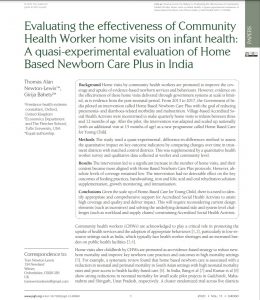
Background
Home visits by community health workers are promoted to improve the coverage and uptake of evidence-based newborn services and behaviours. However, evidence on the effectiveness of these home visits delivered through government systems at scale is limited, as is evidence from the post-neonatal period. From 2013 to 2017, the Government of India piloted an intervention called Home Based Newborn Care Plus with the goal of reducing pneumonia- and diarrhoea-related morbidity and malnutrition. Village-based Accredited Social Health Activists were incentivised to make quarterly home visits to infants between three and 12 months of age. After the pilot, the intervention was adapted and scaled up nationally (with an additional visit at 15 months of age) as a new programme called Home Based Care for Young Child.
Methods
The study used a quasi-experimental, difference-in-differences method to assess the quantitative impact on key outcome indicators by comparing changes over time in treatment districts with matched control districts. This was supplemented by a quantitative health worker survey and qualitative data collected at worker and community level.
Results
The intervention led to a significant increase in the number of home visits, and their content became more aligned with Home Based Newborn Care Plus protocols. However, absolute levels of coverage remained low. The intervention had no detectable effect on the key outcomes of feeding practices, handwashing, iron and folic acid and oral rehydration solution supplementation, growth monitoring, and immunisation.